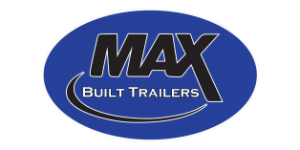Your trailer is only as reliable as the tires it’s riding on. Whether you’re hauling equipment to a job site, towing gear across the Southeast, or moving heavy loads on rural Georgia roads, trailer tire maintenance is one of the most overlooked — and most critical — aspects of safe, cost-effective hauling.
A single blowout can damage your trailer, delay your work, and cost you hundreds in repairs or replacements. But with a solid tire maintenance routine, you can prevent most tire failures, extend tire life, and stay safe on the road.
At Max Built Trailers, we don’t just sell trailers — we help customers protect their investment. Here’s what every trailer owner should know about tire maintenance, safety, and smart replacement.
Why Trailer Tires Fail
Before we get into best practices, it’s important to understand what causes most trailer tire blowouts or premature wear. Unlike passenger car tires, trailer tires are exposed to higher loads, longer idle periods, and different stress points.
Common reasons for trailer tire failure:
- Underinflation: This is the #1 cause of trailer tire blowouts. Low pressure leads to excessive heat, which breaks down tire structure.
- Overloading: Exceeding your trailer’s axle or tire weight ratings can cause sidewall failures and unsafe handling.
- Dry rot or weathering: Trailers stored outside in sun and weather often develop cracks in the sidewalls, even if the tread looks unused.
- Age: Trailer tires degrade with time, even with low mileage. Most manufacturers recommend replacement every 5–6 years regardless of tread.
- Incorrect tire type: Using passenger tires (P-rated) instead of proper trailer (ST-rated) tires can cause unsafe handling and uneven wear.
Trailer tires have different design requirements than automotive tires — they must withstand heavy vertical loads and provide stability, not cornering performance. That’s why using the right tire type is critical.
Choose the Right Trailer Tires
If you’re not sure what kind of tires your trailer needs, start by checking the sidewall of your current tires. Look for the “ST” prefix — it stands for “Special Trailer” and indicates that the tire is designed for trailer use only.
Trailer tires should also match your gross trailer weight rating (GTWR). The total load capacity of all tires combined must meet or exceed the GTWR. And don’t forget to factor in cargo — not just the trailer weight.
How to Extend Tire Life
Keeping your trailer tires in top condition doesn’t require a lot of work, but it does require consistency. Here are the key steps:
- Check tire pressure before every trip. Always inflate to the manufacturer’s recommended PSI — never guess.
- Inspect tires regularly. Look for cracks, bulges, low tread, embedded objects, or uneven wear.
- Avoid extended sun exposure. Store your trailer indoors or use tire covers to prevent dry rot.
- Rotate tires annually. If your trailer sees frequent use, rotating tires helps distribute wear evenly.
- Balance and align. An unbalanced or misaligned trailer can cause premature tire wear and handling problems.
- Replace aged tires — even if they look fine. Rubber deteriorates over time. Check the DOT code on the sidewall to find the manufacture date.
Smart Tools to Help With Tire Maintenance
- Tire Pressure Monitoring Systems (TPMS): Real-time alerts for pressure drops, especially valuable for long hauls.
- Digital Tire Gauges: Give quick and accurate readings compared to analog versions.
- Torque Wrenches: Ensure your lug nuts are tightened to spec, especially after tire changes.
- Wheel Chocks: Prevent trailer movement during inspections and maintenance.
- Spare Tire Mounts and Locks: A mounted spare can save you hours of delay if you get a flat on the road.
Conclusion
Tire blowouts are preventable — and maintaining your trailer’s tires is one of the smartest ways to protect your time, money, and safety. By understanding what causes failure and committing to a simple maintenance routine, you’ll avoid expensive surprises and keep your rig rolling smoothly.
Looking for expert recommendations or new tires for your trailer? Visit our Resource Center or stop by one of our Max Built Trailers locations to get the gear and guidance you need.






